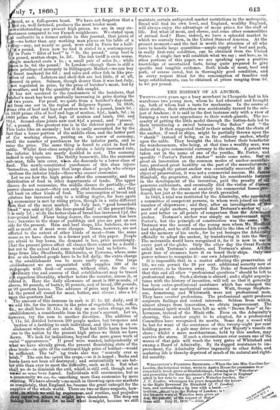THE HISTORY OF AN ANCHOR.
TWENTY-FIVE years ago a busy merchant in Cheapside had in his warehouse two young men, whom he had educated and brought up, both of whom had a taste for mechanics. In the course of their studies, their attention was accidentally turned to the sub- ject of Anchors ; it is said in the first instance only with a view of forming a very neat appendance to their watch-guards. The ne- cessity of getting the little model through the button-hole led to their introducing a swivel between "the flukes" and "the shank." It then suggested itself to their minds, that the chain of the anchor, if used in ships, might be partially thrown upon the "shank" instead of being, as in the ordinary anchor, wholly upon the cable. They brought the idea before their benefactor the warehouseman, who being, at that time a wealthy man, was induced to give commercial currency to the notion. A patent was taken out in the name of one of the youths, Mr. Porter, and speedily "Porter's Patent Anchor" made some noise. But so great an innovation on the common modes of anchor-manufac- ture, produced great hostility on the part of the manufacturers ; and although the patent anchor was essentially successful in its object of preservation, it was not a commercial success. Mr. James, Honiball, the proprietor, after sinking his considerable fortunti in the development of the invention, paid the penalty of all generous enthusiasts, and eventually died the victim of disease brought on by the strain of anxiety his commercial lbsses pro- duced, but just at the moment the truth prevailed. In 1853, a trial was instituted by the Admiralty, who appointed a committee of competent persons, to whom were joined an equal number of shipowners ; and they, after an investigation of th merit of eight anchors, reported that Trotman's,anchor w: per cent better on all points of comparison than the Adm'iran,y anchor. Trotman's anchor was simply an improvement upon Porter's, but the principle of construction was the same. Mr. Trotman was the second of the young men whom Mr. Fronibill had adopted, and he still remains faithful to the idea of his youth, and the memory of his uncle, for he yet besieges the Admiralty officially to adopt the anchor, by transferring it into the Navy. The mercantile world have recognized it, for it is now in use ut every part of the globe. Only the other day the Great Eastern sailed with Trotman's anchors, and Trotman's alone. All the great line of steamers have it on board their ships. Only one power refuses to recognize it : our own Admiralty.
It is impossible that in a matter affecting the preservation of life, we can permit the 28 per cent, additional security now at our service, to be thrown away. The Duke of Somerset claims that this and all other "professional questions" should be left to professional men. Such a dictum is absurd ; and a slight acquain- tance with the history of invention, will tell us that it generally has been extra-professional assistance which has enlarged the boundaries of our mechanical sciences. Watt, George Stephen- son, Armstrong, and Whitworth were not proftrasional men. They have created professions. The professional spirit produces corporate feelings and vested interests. Seldom from within, almost always from innovation, we obtain improvement. The professional spirit would have left us with "Brown Bess" at In- kermann, instead of the Itfinie rifle. Even on the Admiralty's showing, this anchor ought to be adopted, for a professional Committee have recognized its merits. Some day a vessel will be lost for want of the assistance of this twenty-eight per cent holding power. A gale may drive one of her Majesty's vessels on shore ; whilst a mere merchantman, held by this anchor, may survive the storm. If such a circumstance ever occurs one or the waves of that gale will reach the very gates of Whitehall and swamp a Board of Admiralty. By its dogged resistance to im- provement, ttLe Admiralty drives ingenuity to other fields, and seafaring life is thereby deprived of much of its natural and right- ful security.


























 Previous page
Previous page